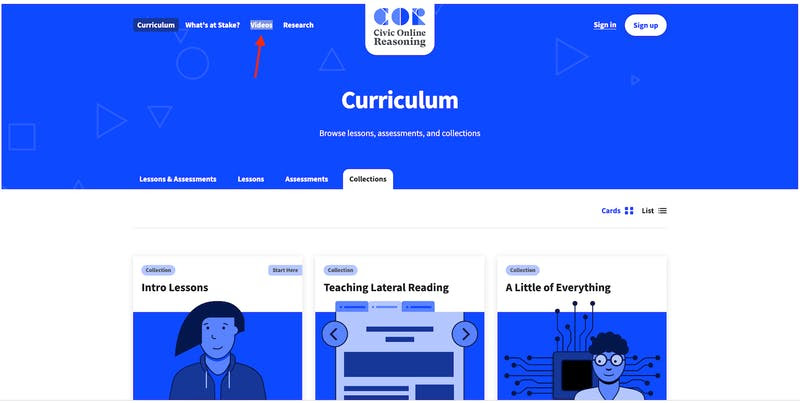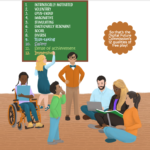
Given the disinformation campaign in Russia’s war on Ukraine, I decided to revisit the Stanford History Education Group. I have written about SHEG several times on the MIndful Digital Life blog. This passage is from the opening of the Executive Summary of the report “Evaluating Information: The Cornerstone of Civic Online Reasoning” by the Stanford History Education Group:
“…we sought to establish a reasonable bar, a level of performance we hoped was within reach of most middle school, high school, and college students. For example, we would hope that middle school students could distinguish an ad from a news story. By high school, we would hope that students reading about gun laws would notice that a chart came from a gun owners’ political action committee. And, in 2016, we would hope college students, who spend hours each day online, would look beyond a .org URL and ask who’s behind a site that presents only one side of a contentious issue. But in every case and at every level, we were taken aback by students’ lack of preparation.”
On this trip to SHEG’s Civic Online Reasoning curriculum, I discovered a video series with author, podcast host, and video content creator John Green. I don’t know how I managed to not know about John Green (The Fault in Our Stars) by name, but I’m glad that I know him now. John started Crash Course, an educational YouTube channel, with his brother Hank Green. John hosts the 10-episode Crash Course series on Navigating Digital Information, created in partnership with The Stanford History Education Group, MediaWise, and The Poynter Institute. The series begins with a 5-minute Preview, and the following 10 episodes are each about 15-minutes long.
Here’s John speaking in the very short Preview:
“Now much attention has been paid, rightly, to the ways that misinformation and disinformation are shaping our political and social discourse, but they’re also shaping us as individuals and as communities, and getting better at evaluating information means becoming a better citizen of the communities where you live. It also means becoming a more informed and more engaged person.”
This series is an excellent catalyst for a family (or classroom) in-depth exploration on navigating digital information. Check out the Preview and get acquainted with John if you’re not already familiar with him. And then watch the short videos together and dive into a conversation about your own habits consuming or engaging digital content.
You’ll find the videos on SHEG’s Civic Online Reasoning website. Click Videos (see red arrow in the image above) in the top left horizontal menu. Then scroll down to the Crash Course: Navigating Digital Information Preview and videos #1—10.
Navigating digital information consciously is a skill we can, and must grow, continually. The SHEG curriculum can support building a strong foundation of skills. Talking with each other about the challenges of mis- and disinformation is essential.
You might want to read (or revisit) a few of my previous posts about SHEG and the curriculum they’ve created to help prepare young people to develop essential civic online reasoning.
From Digital Literacy to Critical Digital Literacy
A Kids Book About…
In my last post, I shared a lesson plan, Contextualizing the Crisis in Ukraine, created by Pulitzer Center for older kids/students. I promised I would share a resource for talking about war with young children in this post. With the war in Ukraine permeating our attention and media, it’s likely our children have overheard snippets here and there about what’s happening. Or they may have family and friends in the many places on the planet currently impacted by wars.
The publishing group A Kids Company About has made A Kids Book About War available for free with an optional donation to one of several groups providing aid including Doctors Without Borders. The download is available in a range of formats including PDF. You can read a little about the author, Sarah Jones, an Emmy-award winner who has reported from conflict zones for outlets including Al-Jazeera, BBC World Service, and CNN here. Here is an excerpt from that review:
“In the intro for A Kids Book About War, Jones wrote that the book is meant to create space for conversation between children and adults on a complex topic that unfortunately will remain relevant. ‘This book also creates space to think critically about what starts wars and why they keep happening, and what we can learn from our past to create a better future,’ she wrote.”
I appreciate the emphasis on creating “space for conversation between children and adults on a complex topic…” and on creating a better future. I am not recommending this book to read to your kids although you may choose to do so. I am suggesting that you read it yourself to help you consider what about it works for you and what might not—to help you in thinking about how you want to go about having one of the more difficult conversations imaginable with your children—talking about war.


